Human. Too human. That's the feeling of her. And that humanity seems to spring from an endless well of crystal clear water. Vesselina Kasarova.
When it's not stupid to be sincere. And it's not weakness when the tears don't just stay at home. When a good example melts your heart. When you know how to be grateful. When love is found in every moment of your life. Yes, there are such people. Bulgarians. Talented. Charismatic. Flesh and blood. Ready to be embraced. Open to embrace. Not just physically, but through their spirit – like the angel wings that sprout on lovers – from a smile, a small gesture, a kind word.
The meeting with Vesselina Kasarova is the most unexpected thing that can happen to a person who has never communicated with her. But also the most unexpected, given the charm she radiates from the stage.
She is a real rock and roll girl in the world of opera – because of the rhythm – 140 concerts in two years, the dynamics – tours all over the world, the discipline, the hygiene and the principles. And all this goes forward and succeeds, because of and despite the conviction not to rush and be careful in experiments. And so 35 years, in which there is only one single omission...
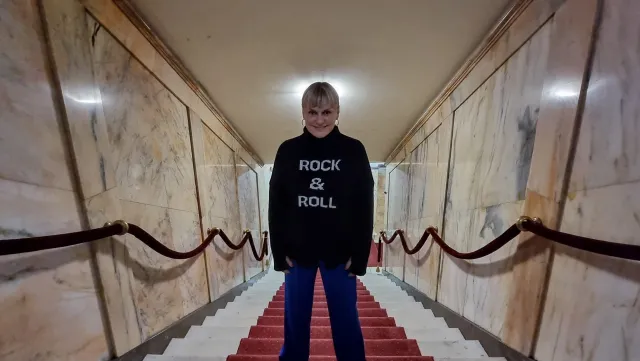
Vesselina Kasarova – about the unforgettable moments and about being in the right place at the right time, about the only way she would never go back, about the moment when an artist has to stop, about the difference between distrust and believing in yourself, about the cage and the burn, about nostalgia and the return to Bulgaria. The names of Ghena Dimitrova, Svetozar Donev and Marius Kurkinski, Riccardo Muti, Karajan and Holender, Marilyn Horne, Cecilia Bartoli, Barbara Frittoli... are intertwined in the conversation with her.
Is it true that when you were little you wanted to become Lili Ivanova?
- Yes. I learned it a few years ago from my mother. It is also very interesting that the street I grew up on in Stara Zagora is named after Hristina Morfova, who, like me, is an opera singer. Then one of our neighbours from that street asked me what I wanted to be when I grew up. I answered "I want to become Lili Ivanova". I can't remember... Here it is, since I was little girl... How important it is...
I thank fate that I am an opera singer, and that I have wanted to deal with singing since I was a little girl, and it has made a huge impression on me. Lili Ivanova! I am a big fan of Mrs. Ivanova. A big fan!
And why are you only now making a class at the Sofia Opera?
- I don't know... Actually, I started master classes for the first time outside Bulgaria, four or five years ago. And my first appearance as a teacher was in Basel, Switzerland, where a German television filmed my work with young singers for the local university for performers. So I started...
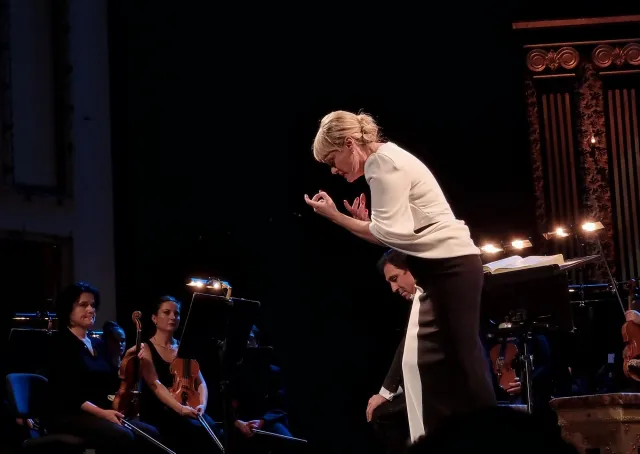
I always knew intuitively that it was a very responsible thing to do. I knew that a person who had made a great career had no guarantee that he would be a good teacher. There is also no guarantee for a person who has not been good at his profession (she laughs – n.a.).
Over the years I have helped colleagues who were in what I call a voice crisis. This means that there has been some surgical intervention on the voice. I've helped them to get back to the stage.
And why so late? I don't know... They should make master classes at the Sofia Opera...
Is there a moment or snapshot – not an event – of those 35 years that you will never forget?
- This is a very good question. The things are several. Firstly, this is my meeting with Karajan (Herbert von Karajan, one of the most outstanding conductors of the 20th century, 1908-1989 – n.а.) as a student at the conservatoire. He opened the way for me to the Western world. Karajan would not have known about me if Ghena Dimitrova had not given me the chance to sing with her at the Sofia Opera. The great Ghena Dimitrova! Luisa Lazar Petrov, an impresario, was present at this concert, and she made a tape recording and sent it to Karajan and to Holender in Vienna.
I got contracts for the Vienna Opera after auditioning with Ioan Holender. By the way, I didn't go to a competition in Bilbao, I came home to Stara Zagora. But the Director of the Zurich Opera heard me there. I was just in the right place at the right time...
I'll never forget when I replaced Marilyn Horne (American opera singer with a range from contralto to coloratura soprano, born in 1934 – n. a.) in Salzburg in 1992. I made my debut very young. I learned Tancredi (from Rossini's opera of the same name - n.d.) in two weeks – 500 pages of opera... It was a very important moment for me, as was my debut at the Vienna Opera, the same year, with “Il bariere di Siviglia”.
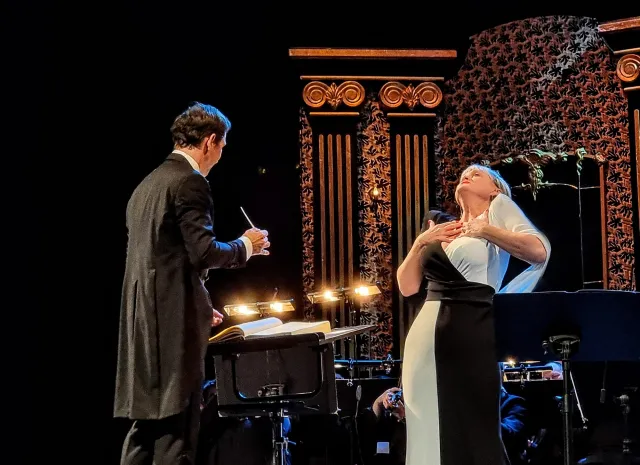
I will go back even further... I will not forget the Sofia Opera when the late Svetozar Donev offered me to sing as a soloist. He was the first Bulgarian who gave me a hand. And here I was able to sing in “Il bariere di Siviglia”, “La forza del destino” and “Nabucco”. In 1992, it was also my debut at la Scala di Milano with a song evening, not with anything else...
And again for those 35 years – is there a road you would never go back down?
- Just for my son's sake... I was a tireless horse, with tremendous discipline. I don't want that back that I wasn't at my son's birthday parties. That I left him at six years old in Zurich and my mother took care of him. Up to that point, I had travelled all over the world with him. I wouldn't have gone through that, but it was inevitable...
Are you catching up now, even though he's 23?
- Of course. He's 23, medical student, fifth year. He's a completely different person. Soon we had a conversation, the two of us, talking about a personal topic, and I said to him "Ivka, I'm sorry. Maybe it's my fault." He said, "No, Mom. There was nothing you could do about it anyway. Even if you were at home." I have guilt, but I'm glad I have a child. Because, to have a child with such a profession, it's extremely difficult – not only physically, but psychologically, it's terribly difficult.
You have many debuts, which critics mostly describe as remarkable. Is there a limit at which an opera singer should stop with debuts and only develop and expand on his previous roles?
- Of course. I even gave up some roles. At the moment I'm singing only this...
Of course, I made my debut two years ago with Azucena (role from Verdi's opera "Il trovatore" – n.a.). But I am that kind of person. At 39 I debuted with "Der Rosenkavalier", at 42 – with "Carmen", now I'm 57...
What saves me is that something has always protected me. I've had good counsellors. They are one or two in my professional life who have told me not to rush into the dramatic repertoire.
At some point you just have to give up. It becomes critical when one starts wanting to prove something to oneself. That's no longer healthy.
Maestro Karajan is the one who told you not to hurry. Are these his words that you will never forget?
- Yes. My voice couldn't get into some drawer. I could do a lot of things, but I never did experiments.
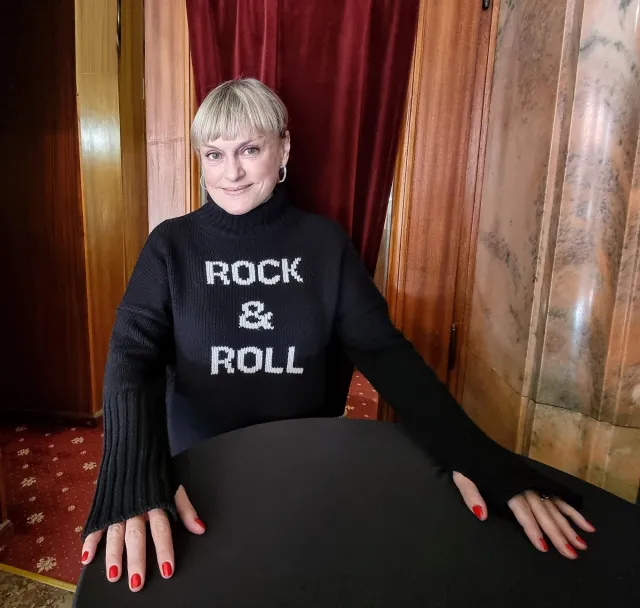
For example, in 1994 I sang "Cosi fan tutte" ("This is what all women do", a comic opera by Mozart – n.a.) in Vienna. We were one cast with Cecilia Bartoli as Despina, I was Dorabella, Barbara Frittoli was Fiordiligi... After a few performances Riccardo Muti said to me, "Vesselina, you must sing Azucena". If I had sung Azucena then at La scala di Milano... (She becomes thoughtful – n.a.). Then my manager said: "If we start now with Azucena, where will we go? What are you going to sing in 10 years?"...
In the 1990s, the orchestras started to get bigger and bigger and play like symphonies. Opera is not a symphony. When a singer starts pushing with his voice to seek power, he destroys himself.
That's why, quite curiously, I made my debut as Azucena two years ago... I wouldn't have lasted if I had made a different decision at the time, and there are many such examples in history.
Has Switzerland turned you into a clock?
- Not only Switzerland. I don't like to be late. I will feel guilty if I am not punctual. That's my nature.
I have to make a preface to make my point. I miss Bulgaria very much. I don't know if anyone believes me. I was born here. I miss a lot of things, but I managed to integrate there from a young age.
I am not the only one who will say it, but outside the borders of Bulgaria, no one bows down to us. Outside the borders of Bulgaria, we will be given a hand if we are talented, but no one comes in thinking that they should bow down to us or value us more than what they have.
We Bulgarians have succeeded in sports and in art because everything is very obvious there.
"I found the strength and stayed in Zurich, and the price is high," you said in 2018. Has this price become higher and higher over the years, and in general – is taking stock of life and profession a useful job?
- It doesn't make sense at all... Some people say it's karma... Something has always guided me along the way.
Recently I watched on TV Kurkinski (Marius Kurkinski – n.a.) talking about the church and God... I think we carry an energy and it leads us – whether we want it or not. But we hold everything in our hands, because a person is given something and he must be able to accept it. Like plasticine – it is given to him and he has to be able to make the figure...
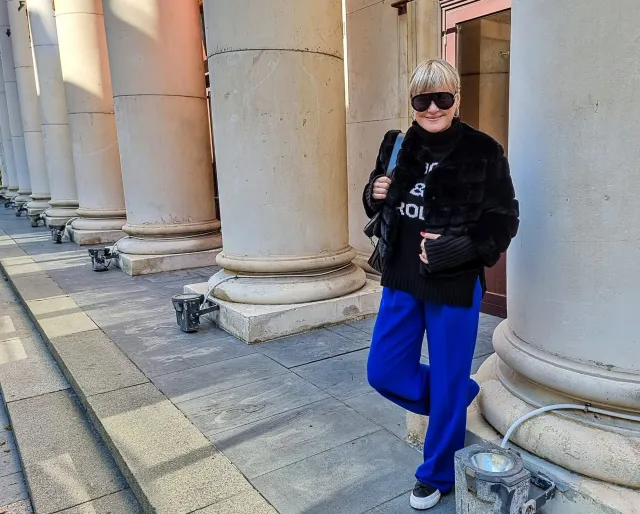
I carry a lot of energy in me and it was given to me from Bulgaria – maybe from my great-grandparents, from my mother and from my dad. I am this way because I am Bulgarian. I don't say it for diplomacy and to have fans. I say it as a fact.
For example, outside Bulgaria there are few of my colleagues who have real energy – and an artist needs it to cope with all the difficulties he encounters.
Yes, I don't live in Bulgaria and the price is high. But where to go back?... My parents passed away... I have no brothers and sisters... It's interesting that as I get older, the nostalgia is growing...
I have no other language in which I can express myself as well as in Bulgarian. Not that I'm a great orator either (She laughs – n. a.). That's why I always return to Bulgaria. And I'm always energized here.
Speaking of nostalgia, what is the place in Stara Zagora that still excites you?
- I get excited when I walk the streets in Stara Zagora because it reminds me of my childhood. The park... I get very excited when I'm in the lime tree season. It's amazing with that smell...
What are the best things you see in Bulgaria?
- Oh, what a question!... It's not nice that I start thinking. But I have to think...
I want to be honest. It's hard to describe, but the good thing is that this is my homeland and that I listen to my native language.
I love the sea of Bulgaria and its aroma. It's nice when you meet your classmates or your students. This is the good thing about Bulgaria.
Do you have plans to record Bulgarian music again?
- I sing Bulgarian music everywhere. It is possible to record new music... It has to be something I am really convinced of. Then I was convinced in Kyurkchiyski (In 2003 the CD "Bulgarian soul" was released with arrangements of folk songs made by Krasimir Kyurkchiyski and performed by Vesselina Kasarova – n.a.).
This music has always inspired and provoked me. This CD is the most prominent for me of all the over 50 I have released. I compare some of Kyurkchiyski's developments to impressionism. Very profound music! Too bad the sheet music got lost...
In 2016 you said something that impressed me, "I'm very opinionated as an artist, I don't trust everyone." Why? Is that still the case?
- Yes. Although I'm not sure that's the word I meant when I used it. I only trust myself. I'm talking about my profession. I've met some exceptionally great personalities, but I only sift out what I'm convinced I need to sift out.
I respect people immensely, but I am not influenced by all the words that are spoken to me. I built this cage because one burns out. You can't do otherwise when you're the centre of attention. We're not talking about arrogance or stupid self-confidence here.
I have to build my little house where my peace is and where I find strength. This little house does not allow me to be bad. This is my positive energy. I do not allow negative energy. When someone bites me, I say to myself, "Vessi, stay who you are."
If I start to change, that's not good. Because an artist sings with his soul. It's a combination of many qualities – not just voice, but mindset, aesthetic and how you treat people. That, being an artist, is a very big philosophy for me.
Let me bring you back to another philosophy – that of cooking. Do you still love to cook? Do you have a favourite dish?
- Oh, my dishes are quite ordinary. Even though I don't live in Bulgaria, I always like to have a touch of our national cuisine. I also love to cook because I am a stay-at-home person and I love the cosiness. I love to make hotch-potch. Recently in Zurich, cabbage came out and that was an occasion to cook pork and cabbage, which I like very much.
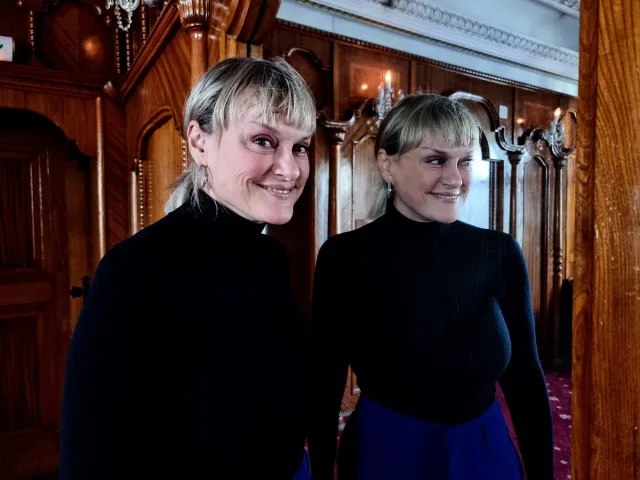
I don't like and never have liked going to parties. It's very tiring and takes a lot of my strength as a singer. But I love people... You must have a lot of discipline when you sing 80 spectacles a year.
Having used the verb love a dozen times in less than a minute, I can't help but ask you how you would continue the sentence, I am a person who loves...
- (Answers without thinking – n.a.) ... loves the good...
